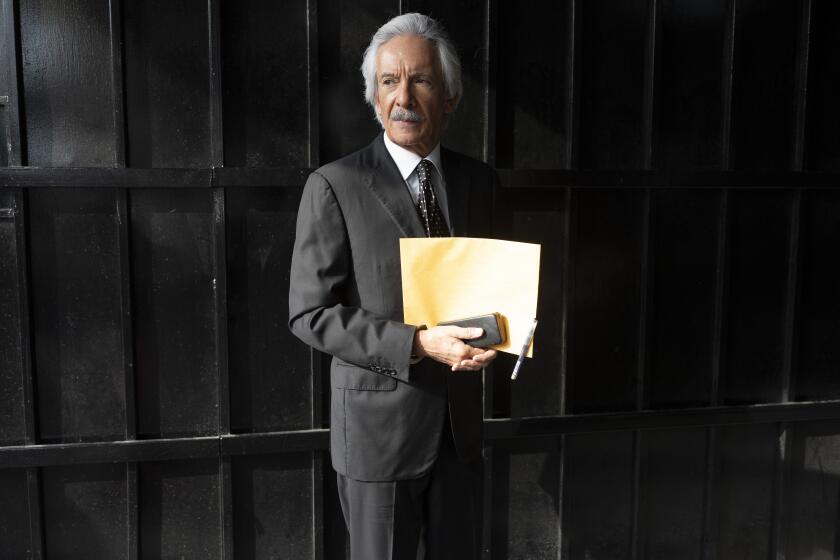China Ousts 3 Ranking Hard-Liners : Politics: Trio removed by party congress played key role in implementing repression. The move bolsters those favoring faster economic reforms.
China’s Communist Party launched a new ideological housecleaning Sunday, sweeping three key hard-line ideologues from high party positions.
Acting Culture Minister He Jingzhi, party Propaganda Department head Wang Renzhi and People’s Daily Director Gao Di have been removed from the party’s Central Committee, the official New China News Agency reported.
These three men played key roles in implementing harsh political controls after the 1989 massacre of pro-democracy protesters in Beijing. The three have been widely reviled by Chinese intellectuals and the more reformist wing of the Communist Party itself, and their full departure from power would indicate a significant easing of political and cultural repression here.
A new 189-member Central Committee, endorsed Sunday at the closing session of the party’s 14th National Congress, today elected a new 20-member Politburo composed of relatively young and reform-minded officials. The elite Politburo Standing Committee gained three new members, including reformist Vice Premier Zhu Rongji, 64.
It has been rumored since early this year that senior leader Deng Xiaoping, 88, had turned against He, Wang and Gao after deciding that they were placing obstacles in the way of accelerated economic reforms.
Loss of their Central Committee posts does not automatically mean they must lose their other jobs too. But their influence is clearly waning, and it would be surprising if they do not lose their other positions fairly soon.
Also stepping down from the Central Committee and the ruling Politburo are eight of 14 current members of the Politburo, including President Yang Shangkun, 85, the New China News Agency reported.
The changes are part of a gradual transfer of power to a more reformist and better-educated successor generation. Deng did not attend the congress, but he played a key role in scripting it. The role of the congress is to approve decisions taken beforehand by the Politburo and powerful party elders such as Deng.
The key goal of this congress was to entrench a successor generation of leaders committed to carrying on the policies initiated by Deng when he came to power in 1978.
The New China News Agency declared Sunday that this had been achieved. “The new Central Committee . . . constitutes a firm organizational guarantee for . . . further accelerating the pace of reform, the opening and modernization drive and achieving still greater victories,” it said.
The new Standing Committee will have seven members. General Secretary Jiang Zemin, 66; Premier Li Peng, 63; Li Ruihuan, 58, a reformist with growing authority over ideology, and Qiao Shi, 68, head of the security apparatus, retained their positions.
Joining the Standing Committee, in addition to Zhu, were Central Military Commission Vice Chairman Liu Huaqing, 76, and a former Communist Party secretary for the Tibet Autonomous Region, Hu Jintao, 50.
The new Politburo is expected to push an acceleration of China’s market-oriented economic reforms, including freeing of prices, expansion of fledgling stock markets and a drive to force state-owned enterprises to compete in the marketplace.
Party leaders have stressed that they will not allow any challenge to Communist rule. But the high-level personnel changes now under way should promote a recent trend toward allowing greater freedom in arts, culture and intellectual life.
The expected removal of He, Wang and Gao from their culture, propaganda and media posts would almost certainly strengthen the hand of Li Ruihuan, the most liberal-minded member of the current Standing Committee. It could also undercut the power of Premier Li, the most hard-line of the four Standing Committee holdovers.
There is a rough ideological balance among the departing Politburo members.
Those in the reformist wing of the party who are leaving the Politburo are Defense Minister Qin Jiwei, 77; Vice Premier Wu Xueqian, 70; National People’s Congress Chairman Wan Li, 75, and Sichuan Province Party Secretary Yang Rudai, 65.
Also losing their Politburo seats are Vice Premier Yao Yilin, 75; Beijing City Communist Party Secretary Li Ximing, 66, and Politburo Standing Committee member Song Ping, 75, who are generally viewed as members of the party’s more hard-line faction.
As long as he remains in good health, President Yang, who is personally very close to Deng, is expected to retain great influence even if he eventually gives up all his formal posts. The Politburo retirees are likely to give up their other positions at next spring’s meeting of China’s Parliament, the National People’s Congress.
Sunday’s closing session of the seven-day congress also approved a list of 130 alternate members of the Central Committee. Alternates attend Central Committee meetings and may be promoted to full membership to fill vacancies before the next party congress. Party congresses typically come once every five years.
The New China News Agency said that 47% of the full and alternate Central Committee members are new and that the average age is 56. It said 84% of them have a college education.
The closing session of the congress also disbanded the Central Advisory Commission, a formally powerless but highly influential body of party elders. In so doing it eliminated an institution that has helped aging revolutionaries continue to exercise considerable power long after their formal retirements.
The congress also formally approved a report delivered Monday by General Secretary Jiang, in which he called for creation of a market economy while preserving Communist Party rule.
More to Read
Start your day right
Sign up for Essential California for news, features and recommendations from the L.A. Times and beyond in your inbox six days a week.
You may occasionally receive promotional content from the Los Angeles Times.






